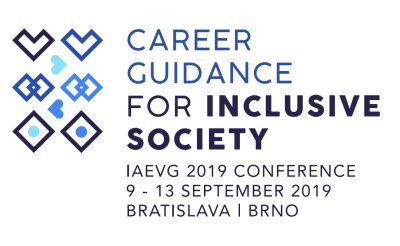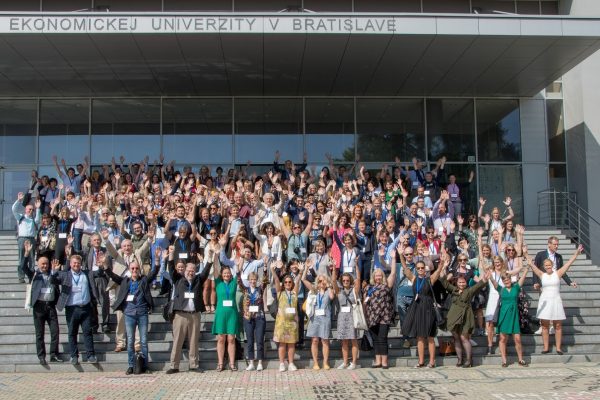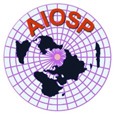Career development experts from all over the world were looking for ways for a more inclusive society in Bratislava
Association for Career Guidance and Career Development, Bratislava, 27/09/2019
 UPDATE 31/03/2020 – We are happy to announce the publication of the IAEVG 2019 Conference Proceedings. You can download them below, or directly on this link.
UPDATE 31/03/2020 – We are happy to announce the publication of the IAEVG 2019 Conference Proceedings. You can download them below, or directly on this link.
On September 11-13, 2019, more than 500 scientists, practitioners and policy makers in career guidance and career development from 46 countries met in Bratislava for the 43rd Conference of the International Association of Educational and Vocational Guidance (IAEVG). The conference was hosted by the Association for Career Guidance and Career Development (ZKPRK) in cooperation with Czech and Slovak partners. The central theme of the Conference was “Career Guidance for Inclusive Society”. IAEVG is the oldest and largest international association in career development with over 18,000 members. With the mission to develop and advocate career guidance interests, IAEVG is an advisory body to the European Council, the UN Economic and Social Council, UNICEF, OECD, ILO, and other multinational institutions.
At the University of Economics in Bratislava keynote speeches were delivered by major career development figures such as Norman Amundson, Annamaria Di Fabio, Gideon Arulmani, Kobus Maree and many others. The insights from other fields brought by Anna Hogenová and Saša Uhlová expanded the perspectives of the attendees, demonstrating the openness and interdisciplinarity of the career development community. A rich three-days program with more than 200 presentations, posters, workshops and innovations in the form of a tools fair provided impulses for reflection and many inspirations for everyday practice.

Family photo from the IAEVG 2019 International Conference in Bratislava. Click on the image of on this link for the official photos.
The following ideas and visions indicating the direction for the career development theory and practice that contribute to building an inclusive society are the main take-aways of the 2019 IAEVG International Conference:
- Career needs to be understood in the context of other aspects of personal, family, social life… Therefore the objectives of career development services should not be limited to isolated issues such as choosing a suitable education or an appropriate job, but help clients proactively manage their life and balance their own needs with the needs of the society. In an inclusive society parents, teachers, guidance practitioners, counsellors, employers and policy makers all contribute to career development of children and adults (Roberta Neault).
- Career development services should be available especially to people from disadvantaged social backgrounds and low-skilled citizens. Accessible, affordable and high-quality career guidance based on their individual needs and taking into account their contexts is a signal to them that the society cares about them. Career development services also lead to proactive career behaviour, promote personal identity development and lead to more effective transition management (Saša Uhlová, Jessie Koen).
- Despite the dynamic social and economic changes associated with the Industry 4.0, pre-industrial, industrial and post-industrial forms of work exist simultaneously in many countries. Career guidance may need to help a community identify and gain modern skills to manage their traditional occupations in a viable manner. Career has its being in the dynamic interaction between the garnering of personal gain and the service the individual renders to society at large, and one of the functions of career guidance is to help maintain the “give-and-receive” reciprocity. If access to such career guidance is a luxury for some, the duty of the larger society to make it affordable for all its members. (Gideon Arulmani, Kobus Maree).
- Career guidance must not get caught in a “pseudo-professionalism” where the priority is to guide the client from behind the desk. Career development practitioners need to get more in touch with the person, to make people feel that they matter, and build up the relationship. The effectiveness of guidance depends on the courage of practitioners to be open and flexible, show real interest in the client and his/her story, to be creative in finding solutions together. This approach can also help the society better understand the needs of its members (Norman Amundson, Annamaria di Fabio).
Interview with Norman Amundson. Follow this link for more official videos.
On the occasion of the 2019 International IAEVG Conference, “Career Guidance for Inclusive Society”, the IAEVG Board of Directors published the Communiqué on Inclusive Societies Investing in their People.
Conference resources:
- New (31/03/2020): Conference proceedings (hi-res download)
- Keynote presentations
- Official photos
- Official videos
- Book of abstracts
Contact: info@iaevgconference2019.sk
International Association for Vocational and Educational Guidance
 The International Association for Educational and Vocational Guidance provides global leadership in and advocates for guidance by promoting ethical, socially just, and best practices throughout the world so that educational and vocational guidance and counselling is available to all citizens from competent and qualified practitioners. IAEVG is the oldest and largest international association in career development with over 18,000 members. With the mission to develop and advocate career guidance interests, IAEVG is an advisory body to the European Council, the UN Economic and Social Council, UNICEF, OECD, ILO and other multinational institutions.
The International Association for Educational and Vocational Guidance provides global leadership in and advocates for guidance by promoting ethical, socially just, and best practices throughout the world so that educational and vocational guidance and counselling is available to all citizens from competent and qualified practitioners. IAEVG is the oldest and largest international association in career development with over 18,000 members. With the mission to develop and advocate career guidance interests, IAEVG is an advisory body to the European Council, the UN Economic and Social Council, UNICEF, OECD, ILO and other multinational institutions.
Association for Career Guidance and Career Development
 The association for Career Guidance and Career Development (ZKPRK) is Slovak non-profit organisation established in 2014. The Association is open both to individuals and organisations working in the area of career development. ZKPRK is an umbrella organization for career guidance and a respected partner for relevant ministries and public administrations in Slovakia in all areas and aspects of career guidance, counselling and career development. The Association is active mainly in the area of training, promotion of good practice, networking of professionals, development of professional and quality standards as well as advocacy.
The association for Career Guidance and Career Development (ZKPRK) is Slovak non-profit organisation established in 2014. The Association is open both to individuals and organisations working in the area of career development. ZKPRK is an umbrella organization for career guidance and a respected partner for relevant ministries and public administrations in Slovakia in all areas and aspects of career guidance, counselling and career development. The Association is active mainly in the area of training, promotion of good practice, networking of professionals, development of professional and quality standards as well as advocacy.
